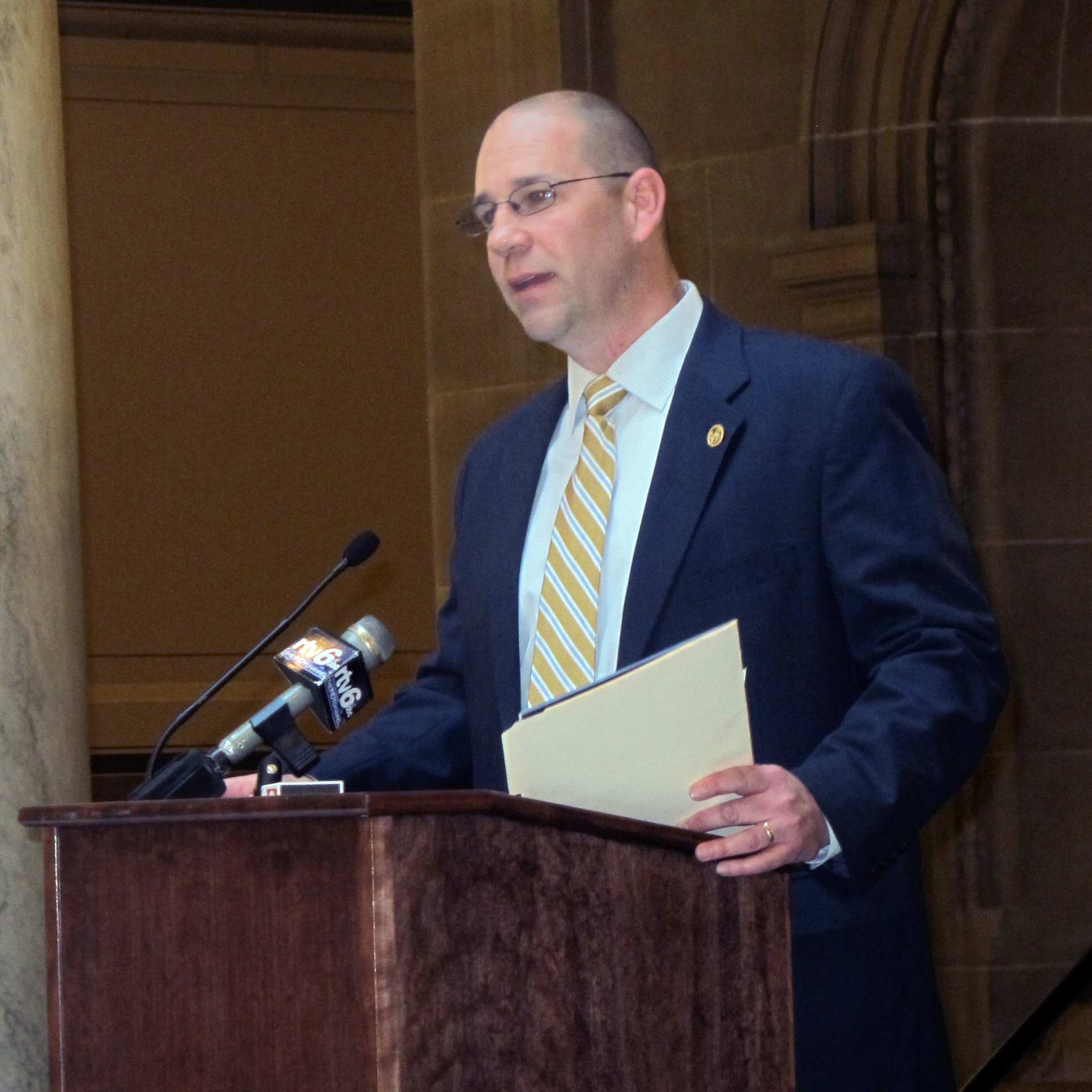Q&A: Five Questions For State Board’s Brad Oliver On Proposed Academic Standards

Kyle Stokes / StateImpact Indiana
State Board of Education member Brad Oliver and state superintendent Glenda Ritz listen during the board's January 2014 meeting.
StateImpact Indiana caught up with State Board of Education member Brad Oliver in Sellersburg Monday night during a public meeting to discuss proposed academic standards. Oliver has been active in the ongoing standards evaluation process and answered a few questions about the draft standards likely to replace Common Core in Indiana.
We’ve included a transcript of our conversation with Oliver below.
StateImpact Indiana: Tell me a little more about the kind of feedback you’re looking for at this point. I know you’ve said you want comments on specific standards, feedback that helps shape the draft process. Is that what you feel you’re getting?
Right now I’m still hearing a lot of folks talking about the process. Not that I’m not concerned with that, but I really believe — and I’m on the record saying this — in the process we’re using. I want to hear more about concerns about the actual language of the standards, particularly from folks who are concerned about use of the Common Core. They’re noticing a lot of standards that are similar or the same. … What I’m still waiting to hear is actual specifics on particular standards at grades K-1 in math and other areas where I keep hearing concerns about how the standards are worded or structured. I’d like to hear more about that from folks who are concerned.
Do you feel like some of that more specific feedback — I would guess that feedback would come in a lot of cases from teachers and educators in the field — do you anticipate more of that will come in online than at these public comment sessions?I sure hope so. I’m also hoping to hear from a number of folks, particularly those who identify as anti-Common Core, because they’ve been writing quite a bit to us. I’m still waiting to hear from them on some specifics because I’m now looking at actual language in the standard and getting down to the actual, what is it we want kids to know and do at each grade level?
So I’d just like to understand better where they’re coming from because you know, I have a background in this, and I’ve looked at them. I feel like the evaluation panels did a good job of doing what we asked them to do, which was to make sure they were clear, specific, free of having any kind of a bias and really making sure we get them articulated well. I think we’ve got some work still to do in the articulation, but we’re about at the halfway point.
Some of the feedback I’ve heard as a reporter is that there are people who thought the old Indiana standards had very good examples and that the Common Core had a lot of exemplar texts and introductory language that obviously the draft standards at this point don’t have. Is that something that would be added in later?
That’s one of the things I keep having to deal with — I keep hearing people talk like the panels are done, and the panels are not done. They’re taking a pause, at least, while we gather public comment on the actual language of the standards. They’ll be coming back to do some revisions. I think at that point it’s obvious that the board and the department staff will have a chance to think about the pieces we may want to add. Examples are always a critical part, but those tend to come after you get the standards set.
Is there any concern at the State Board level that if these standards look too much like Common Core, state lawmakers will throw this back for another rewrite?
Only to the extent of whether or not they really understood what the process was that we utilized. That’s what I keep saying in my comments. You have to go back and look at the process that was utilized to say why are these standards now making it through for public comment?
If again you go back and start from the premise that college- and career-readiness is about making sure students have requisite skills and knowledge prior to being able to go to college without being remediated or go into a career, and you apply that uniformly to whatever standards they looked at, you’re going to see a certain percentage of the standards come through. That’s what forced consensus is about. It’s about a group of subject matter experts saying, we agree, this meets that criteria.
So if they don’t understand that part of the process or they did not watch that process and all they’re doing is comparing, then yes, that’s going to come up because it looks like, well you didn’t really change anything, when what happened was the evaluation panels are basically affirming that it was college- or career-ready or it wasn’t, and therefore we went with a different standard or we revised it somehow. It comes back to making sure people really understand the process.
The group Hoosiers Against Common Core has done a review that says these standards look a little bloated. There are even more standards than there were in the Common Core, and more than the previous Indiana academic standards. Is there still an opportunity to pare these down?
I’ve heard that same criticism from the folks from the Common Core side. I heard it today before us coming down here that there are some that are duplicated. When you’ve looked at the number of standards sets that we’ve asked them to look at, including previous Indiana academic standards, you’re going to have some of that. I think the panels know they’re going to be coming back together here after we get through public comment. Two things you’ll see them do: I hope they’ll take a look at the scope and make sure we’re not too broad, that we’re deep enough, and second, that we have a clear articulation between grade levels. And you’ve heard that come up a couple of times today already.
***
State Board of Education members and Indiana Department of Education staffers will take public comment in from 3-7 p.m. EST today at the Indiana State Library History Reference Room, 315 W. Ohio St., Indianapolis. Watch online here.


